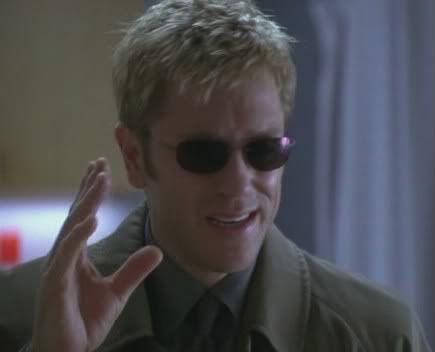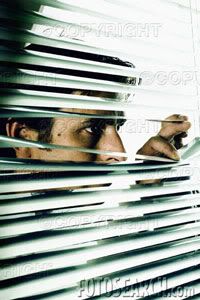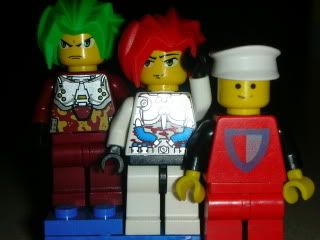|
|
Post by kytdunne on Aug 7, 2005 14:47:45 GMT -5
This convo started in the Past Imperfect thread. Moving it here since it's wandered farther than one ep. I need to take some of these latest posts and think about them long and hard, and maybe respond over in the Pilot thread or "Up on the Roof." Sounded like a good idea to move it. But off the top of my head, I do remember that we discussed this at one point -- the notion of responsibility, which may be a better word than blame, although it's a slippery slope once you get into individual word choices! So. Terry put Jim in an untenable position at the bank that day by wimping out . . . but Jim took responsibility for his actions once he grabbed that gun out of Terry's hands and walked into the street. A hundred different little factors contributed to the overall situation: the gunman's Kevlar armor, the number of cops on the street, the amount of ammo in everyone's guns, you name it. Terry cowering behind that building is, of course, the major factor. But nowhere was it written that Jim Dunbar *had" to be the one -- his actions were his choice, prompted by circumstance and defined by his character. So maybe it does come down to word choice after all! Does Jim *blame* himself for being blinded? We never have even a hint of that -- rather, he is proud that he "took a bullet for four cops." And every cop (and cop's wife) knows that when he walks out the door in the morning, it may be to injury or death. The risk is part of The Job. Nah, I don't think Dunbar's ever blamed himself for this. But neither do I think he blames Terry, which is why it was brought up in the first place. I view their involvement as very much on a level to each other. And that level is far below that of the gunman who killed others and shot Dunbar. IOW, I think the only place blame can be legitimately placed, is on the gunman who shot Dunbar. I believe Jim accepts responsibility for his actions -- but *blames* Terry for putting him in a position where to *not* act would have been a betrayal of all he was. And all Jim ever really wants Terry to do is be honest and admit his culpability. Not grovel or even apologize. Step up, be a man, and get lost. This is where I get picky with word choices. I don't have any arguments with Dunbar being *angry* at Terry for failing as a partner. But not *blaming* Terry for his own blindness. Dunbar's base personality doesn't support that type of misdirection. If Dunbar engages in any misdirected blame, it tends to be blaming himself for circumstances that were beyond his ability to control but he feels responsible for, such as not being able to put away the child molester (Doyle) the first time; not being able to protect his partner or wife as completely as a sighted cop, etc. Which is why Jim treats Greg Hermanson so differently. The reason is twofold. First, Greg is honest -- he admits to his moment of weakness. (Even at their final meeting by the river, Terry is still trying to weasel out.) Second, by now Jim has seen, in Terry, how a moment of cowardice can chew a man up, and lead to stupid, rash, desperate acts. But basically, it's because Greg is honest. That's all Jim ever really wanted from Terry . . . and he never got it. Yeah. That's what I see as Dunbar's reason for being so angry toward Terry, at the outset. Add in Terry's actions in "Up on the Roof" and Dunbar wants even more distance. And if you extend Terry's moment of cowardice to a potential repeat in the future, he really puts all future partners at risk. Which brings up another question: If Terry fails to act at a critical moment in the future, will Dunbar feel as if he deserves some of the blame for that? And does that play into why Dunbar is so angry with Terry that he has difficulties putting that anger to rest? Kyt |
|
|
|
Post by carl1951 on Aug 9, 2005 2:53:50 GMT -5
Terry can't be trusted-period! He was always watching out for himself.
Wasn't Terry's new partner, the pain in the @$$, the first to break down the door, not Terry. He's a coward. Nothing new. Some people get by skating and CYA'ing their whole life.
Later, Carl
|
|
|
|
Post by kytdunne on Aug 9, 2005 23:52:19 GMT -5
Terry can't be trusted-period! He was always watching out for himself. Wasn't Terry's new partner, the pain in the @$$, the first to break down the door, not Terry. He's a coward. Nothing new. Some people get by skating and CYA'ing their whole life. You mean Terry, in general? Or since he froze at the bank? I figure there had to be some good qualities in Terry or Dunbar wouldn't have partnered with him for three years, become his son's godfather, and covered for him. Kyt |
|
|
|
Post by maggiethecat on Aug 10, 2005 10:22:23 GMT -5
Terry can't be trusted-period! He was always watching out for himself. Wasn't Terry's new partner, the pain in the @$$, the first to break down the door, not Terry. He's a coward. Nothing new. Some people get by skating and CYA'ing their whole life. You mean Terry, in general? Or since he froze at the bank? I figure there had to be some good qualities in Terry or Dunbar wouldn't have partnered with him for three years, become his son's godfather, and covered for him. Kyt Thanks for the new thread, Kyt! I agree that there had to be good qualities in in Terry, for all the reasons you mentioned. But it's also possible that men, the little darlings, don't always have the deepest of friendships and I'd put Jim and Terry in that category. Work together, pal around together, barbecues on the weekends, etc. -- you can do that for years, which these two did, and the friendship is never tested. As for the Job itself, I don't think Terry was "skating" through before the bank fiasco -- until then he'd never been tested, just as his friendship with Jim had most likely never been tested in any important way. We've probably talked about this before, but most cops -- and certainly most detectives, where the job is 95% mental prowess -- can go their whole 20 years without drawing their guns. And you can work side by side with someone for years without really knowing them, their true nature or character. Terry was a decent but flawed man who, at arguably the most important moment of his career if not his life, blew it. And he never owned up to this. You could argue that Greg Hermanson also did the same thing -- blew it at an important moment -- but he's honest, admits to his flaws, and that's one of the reasone why Dunbar treats him with such compassion. And of course, since the writers sooooo loved to set up parallels on this show, the contrast between Terry and Greg was deliberate. Gotta go back and read some of the stuff in "Up on the Roof" again . . . ! |
|
|
|
Post by dogma on Aug 10, 2005 10:59:45 GMT -5
just saw a preview on cbs,, the show "without a trace" that is on thurs,, greg hermanson is on it,, in case anyone is interested,,,
|
|
|
|
Post by housemouse on Aug 10, 2005 11:13:09 GMT -5
I agree that there had to be good qualities in in Terry, for all the reasons you mentioned. But it's also possible that men, the little darlings, don't always have the deepest of friendships and I'd put Jim and Terry in that category. Work together, pal around together, barbecues on the weekends, etc. -- you can do that for years, which these two did, and the friendship is never tested. I disagree, I think that even without them being put in that exact situation - one where they needed to draw their guns - Jim and Terry had to have had their partnership/friendship tested. It would almost have to be at some point during all the detective work they must have done together. I also don't think that Terry was no good, I just think he had a moment, the timing was just very bad. Even Jim pointed out in Up on the Roof that no one ever knows how they are going to react in a situation like that. As for the Job itself, I don't think Terry was "skating" through before the bank fiasco -- until then he'd never been tested, just as his friendship with Jim had most likely never been tested in any important way. We've probably talked about this before, but most cops -- and certainly most detectives, where the job is 95% mental prowess -- can go their whole 20 years without drawing their guns. And you can work side by side with someone for years without really knowing them, their true nature or character. Again, I think he was most likely tested to some extent, only in different ways. I am thinking he had to have proven himself to Jim at some point during their partnership. Terry was a decent but flawed man who, at arguably the most important moment of his career if not his life, blew it. And he never owned up to this. You could argue that Greg Hermanson also did the same thing -- blew it at an important moment -- but he's honest, admits to his flaws, and that's one of the reasons why Dunbar treats him with such compassion. And of course, since the writers sooooo loved to set up parallels on this show, the contrast between Terry and Greg was deliberate. I think Terry was just as shocked as anybody by his performance at the bank. He fully believed, up until that very moment, that he would step up in any situation. I see that fact that he disappointed himself as being as devastating to him as anything Jim might blame him for. I agree totally that what sets Terry and Greg apart, at least in Jim's eyes, is definitely the fact that Greg owned up to his actions. Terry's true wimping out didn't happen at the bank, it happened afterwords where he didn't have the cajones to admit that he froze. I believe that is what really steams Jim's bean and causes his disgust with Terry and his compassion toward Greg. |
|
|
|
Post by kytdunne on Aug 11, 2005 2:04:42 GMT -5
I agree that there had to be good qualities in in Terry, for all the reasons you mentioned. But it's also possible that men, the little darlings, don't always have the deepest of friendships and I'd put Jim and Terry in that category. Work together, pal around together, barbecues on the weekends, etc. -- you can do that for years, which these two did, and the friendship is never tested. How do you define a friendship that *is* tested? As for the Job itself, I don't think Terry was "skating" through before the bank fiasco -- until then he'd never been tested, just as his friendship with Jim had most likely never been tested in any important way. We've probably talked about this before, but most cops -- and certainly most detectives, where the job is 95% mental prowess -- can go their whole 20 years without drawing their guns. And you can work side by side with someone for years without really knowing them, their true nature or character. I'd buy the 20 years without *firing* their weapons, but I think it's pushing it about them drawing it. In a standard working environment, sure, you can work beside someone for years and not really know them at all. In more strident working conditions, isn't a good partner someone who can aid, assist and back you up? That's unlikely to have gone untested for three years. For many partnerships, it's *never* tested in the extreme. Terry was a decent but flawed man who, at arguably the most important moment of his career if not his life, blew it. He screwed up, no doubt. But that wasn't the defining moment, as I see it. I can't view that single moment or action as necessarily *defining.* And he never owned up to this. This is where I see the flaw in Terry. Add in shooting himself later, and it's a deep one. This is where his character has been redefined to. He's no more the same man he was before the shooting, than Dunbar is. You could argue that Greg Hermanson also did the same thing -- blew it at an important moment -- but he's honest, admits to his flaws, and that's one of the reasone why Dunbar treats him with such compassion. And of course, since the writers sooooo loved to set up parallels on this show, the contrast between Terry and Greg was deliberate. So what happens in 15 years when Terry owns up to his mistake and tries to find a way to atone for it? Is he then redefined as someone who's honest and admits to his flaws? Kyt |
|
|
|
Post by kytdunne on Aug 11, 2005 2:09:36 GMT -5
I think Terry was just as shocked as anybody by his performance at the bank. He fully believed, up until that very moment, that he would step up in any situation. I see that fact that he disappointed himself as being as devastating to him as anything Jim might blame him for. Really like the way you put this. And I seem to be in full agreement with your entire post. I'm not quite sure what to think about this agreeing stuff. Heh. Kyt |
|
|
|
Post by kytdunne on Aug 11, 2005 2:11:44 GMT -5
just saw a preview on cbs,, the show "without a trace" that is on thurs,, greg hermanson is on it,, in case anyone is interested,,, Thanks. Will have to try to catch this one. I liked him a lot in BJustice, so interested in seeing how he handles another role. Kyt |
|
|
|
Post by housemouse on Aug 11, 2005 8:13:32 GMT -5
Really like the way you put this. And I seem to be in full agreement with your entire post. I'm not quite sure what to think about this agreeing stuff. Heh. Kyt LOL! When I saw you added more to this thread I couldn't wait to start reading. I wasn't expecting total agreement. Should we go back to jumping the shark? hehehe |
|
|
|
Post by housemouse on Aug 12, 2005 8:39:27 GMT -5
I also put this in the Up on the Roof thread, but it definately fits here too.
I noticed something when Jim confronted Terry about the handkerchief. I think that Jim really wanted Terry just to step up and take responsibility for what happened at the bank. He was standing there just waiting for Terry to come out and say he screwed up. The fact that Terry kept saying it wasn't him there that day sealed his fate with Jim. Jim gave him every chance, and wanted him to admit his mistake. This is what really showed what kind of man Terry is.
|
|






